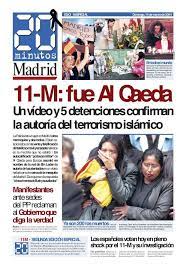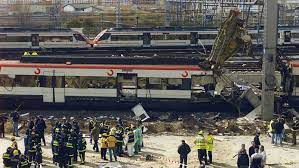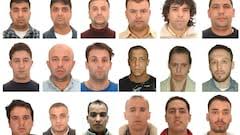By The History Man
 Today is the 20th anniversary of the 2004 Madrid train bombings (known in Spain as 11-M).
Today is the 20th anniversary of the 2004 Madrid train bombings (known in Spain as 11-M).
In the morning rush hour of Thursday 11 March 2004 a series of coordinated, almost simultaneous bombings against the Cercanías (commuter train system) of Madrid hit the Spanish capital, killing 193 people and injuring around 2,050.
Overview
 The bombings constituted the deadliest terrorist attack carried out in the history of Spain and the deadliest in Europe since Lockerbie in 1988. The attacks were carried out by individuals who opposed Spanish involvement in the 2003 US-led invasion of Iraq.
The bombings constituted the deadliest terrorist attack carried out in the history of Spain and the deadliest in Europe since Lockerbie in 1988. The attacks were carried out by individuals who opposed Spanish involvement in the 2003 US-led invasion of Iraq.
The attacks took place three days before Spain’s general elections were scheduled.
Controversy about the handling and representation of the bombings by the government arose, with Spain's two main political parties—the Spanish Socialist Workers’ Party (PSOE) and the Partido Popular (PP)—accusing each other of concealing or distorting evidence for electoral reasons.
In the elections, on Sunday 14 March, Prime Minister José María Aznar’s Partido Popular was defeated. The PP leaders claimed evidence indicating the Basque separatist organisation ETA (Euskadi Ta Askatasuna) was responsible for the bombings, while the opposition claimed that the PP was trying to prevent the public from knowing it had been an Islamist attack, which would be interpreted as the direct result of Spain's involvement in Iraq, an unpopular war which the government had entered without the approval of the Spanish Parliament.
The scale and precise planning of the attacks reactivated memories of the September 11 attacks on the Twin Towers in New York (9-11).
Following the Madrid attacks, there were nationwide demonstrations and protests demanding that the government "tell the truth." The prevailing opinion of political analysts is that the Aznar administration lost the general elections because of the handling and representation of the terrorist attacks, rather than because of the bombings per se.
Diary of an atrocity
 During the peak of Madrid rush hour on the morning of Thursday, 11 March 2004, ten explosions occurred aboard four commuter trains (cercanías). The date, 11 March, led to the abbreviation of the incident as "11-M".
During the peak of Madrid rush hour on the morning of Thursday, 11 March 2004, ten explosions occurred aboard four commuter trains (cercanías). The date, 11 March, led to the abbreviation of the incident as "11-M".
All the affected trains were travelling on the same line and in the same direction between Alcalá de Henares and the Atocha station in Madrid. It was later reported that thirteen improvised explosive devices (IEDs) had been placed on the trains.
Bomb disposal teams (TEDAX) arriving at the scenes of the explosions detonated two of the remaining three IEDs in controlled explosions, but the third was not found until later in the evening, having been stored inadvertently with luggage taken from one of the trains. The following timeline of events comes from the judicial investigation.
All four trains had departed the Alcalá de Henares station between 07:01 and 07:14. The explosions took place between 07:37 and 07:40.
At 08:00, emergency relief workers began arriving at the scenes of the bombings. The police reported numerous victims and spoke of 50 wounded and several dead.
By 08:30 the emergency ambulance service, SAMUR (Servicio de Asistencia Municipal de Urgencia y Rescate), had set up a field hospital at the Daoiz y Velarde sports facility.
Later the death toll had risen to 193 confirmed dead victims, and around 2,050 injured.
Personal recollections
 I vividly remember that morning. I was in the middle of a residential education conference at Haydock Park Racecourse on Merseyside. On the morning of the bombings, I had just had breakfast when news of the atrocity broke.
I vividly remember that morning. I was in the middle of a residential education conference at Haydock Park Racecourse on Merseyside. On the morning of the bombings, I had just had breakfast when news of the atrocity broke.
In the course of watching the TV news and reading about it online, I broke down. I was weeping uncontrollably. Why?
A kindly primary headteacher I knew well asked me what was up. I told him. I was distraught. I couldn’t explain my reaction, other than that I had had a close relationship with Spain over many years, had been to Madrid a few times and knew the main station Atocha. It was all a bit too close to home.
He advised me to pull out of the conference and go home, which is what I did, eventually.
I attended the first session, but couldn’t concentrate, so took my leave at the coffee break.
With hindsight I’d had a nervous breakdown and the following week was sent on gardening leave with full pay.
There was turmoil within the education department I worked for (Sefton Council) and, fully unconnected with my breakdown, by Easter of the following year, I and a half a dozen other schools advisers had been made redundant and offered early retirement with access to our work pensions.
11-M aftermath
 Back to the 11-M bombings in Madrid, the culprits were identified as Jihadi sympathisers, who, when discovered in an apartment building in a suburb of Madrid, blew themselves up. Later, other co-conspirators were identified, tried in court and gaoled.
Back to the 11-M bombings in Madrid, the culprits were identified as Jihadi sympathisers, who, when discovered in an apartment building in a suburb of Madrid, blew themselves up. Later, other co-conspirators were identified, tried in court and gaoled.
So, today is a poignant anniversary. There has been blanket coverage in the Spanish Press, on TV and online.
It’s certainly an event I shall never forget.
© The History Man
Acknowledgements:
ABC
At the Races
Diario Sur
El Diario
Paul Whitelock
Racecourse hospitality
RTVE
Wikipedia
Tags:
9-11, 11-M, 11 March 2004, Alcalá de Henares, Atocha, bomb disposal, bombings, cercanías, Daoiz y Velarde, Diario Sur, early retirement, gardening leave, Haydock Racecourse, History Man, IEDs, improvised explosive devices, Iraq, Jihadi, José María Aznar, Lockerbie, Madrid, Merseyside, nervous breakdown, PP, PSOE, Paul Whitelock, prime minister, redundant, SAMUR, Sefton Council, Servicio de Asistencia Municipal de Urgencia y Rescate, TEDAX, Wikipedia